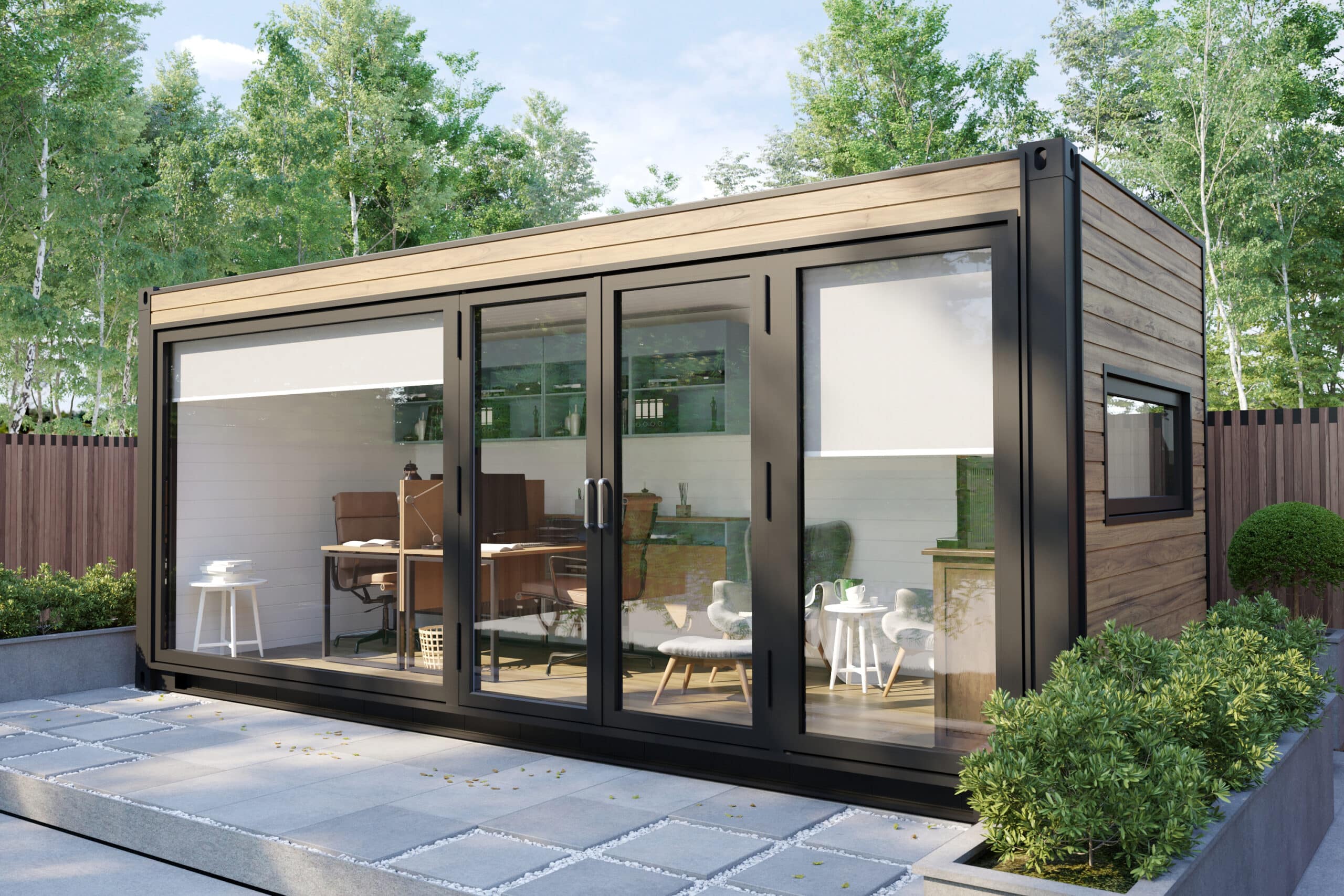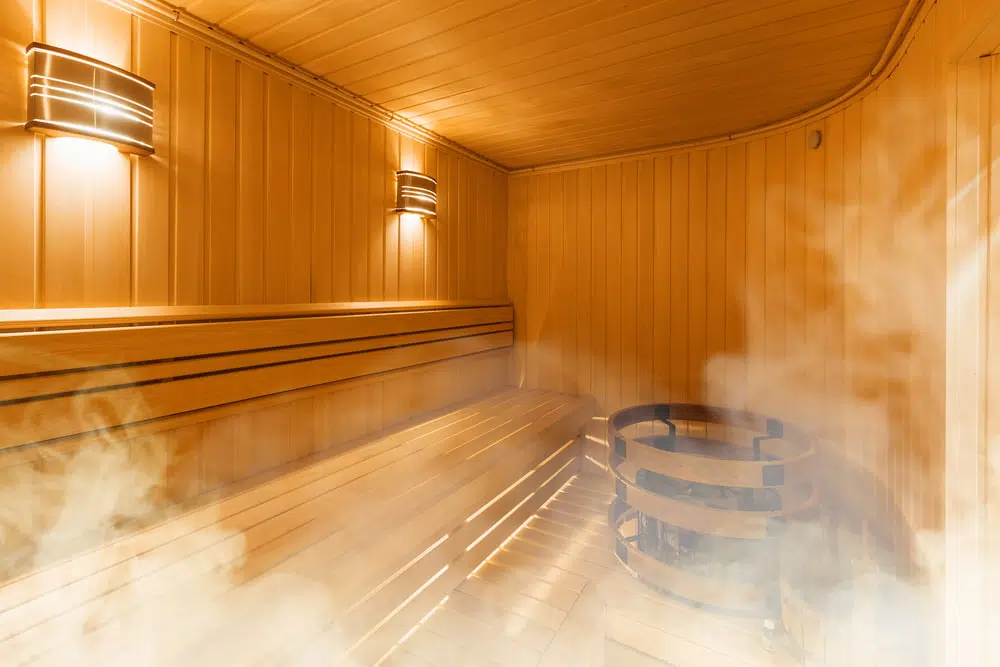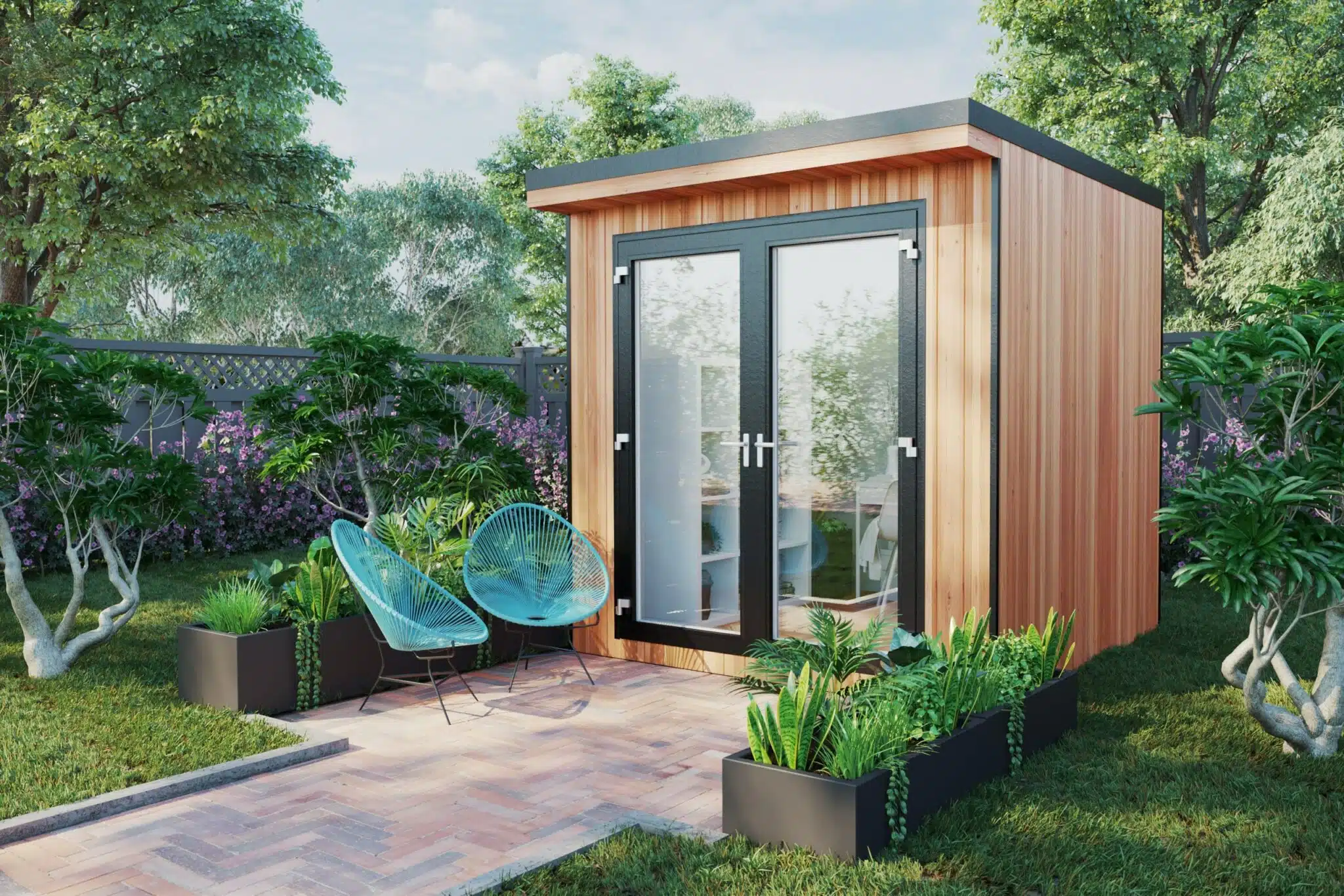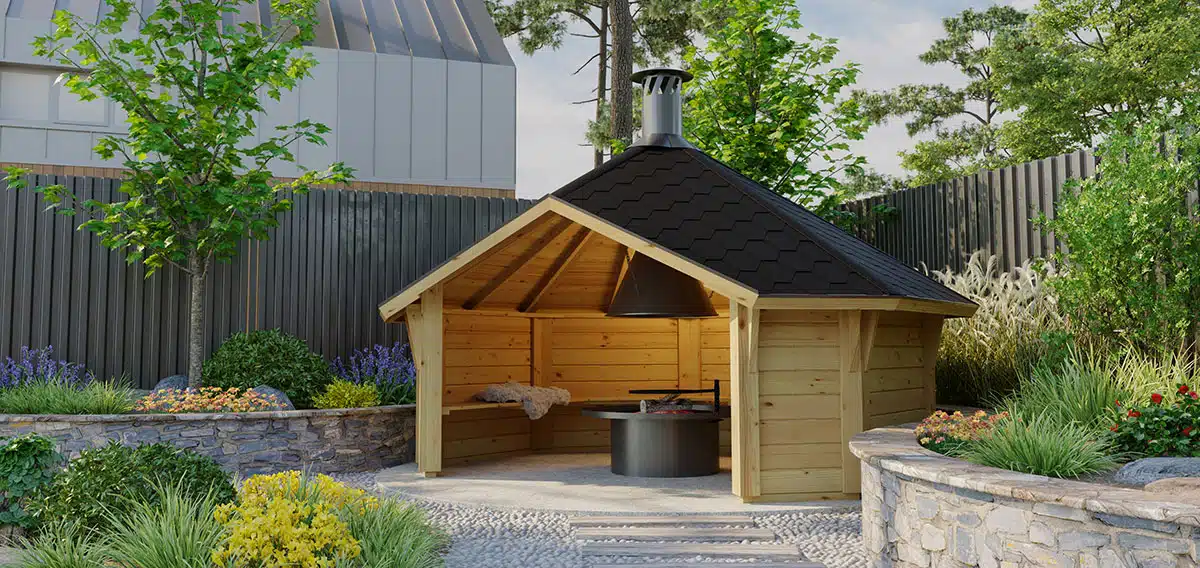What’s The Difference Between a Summer House & a Shed?
09.02.2024
When comparing a summer house and a shed, it’s important to understand that while both are structures often found in gardens or backyards, their purposes, designs, and typical uses can be quite different. Many clients ask about the difference between a summer house and a shed and knowing the answer is an essential step towards finding the perfect solution for an outdoor area. The major differences between a summer house and a shed consist of the sizes and the main uses. Here’s a comparative study:
What Is a Summer House?
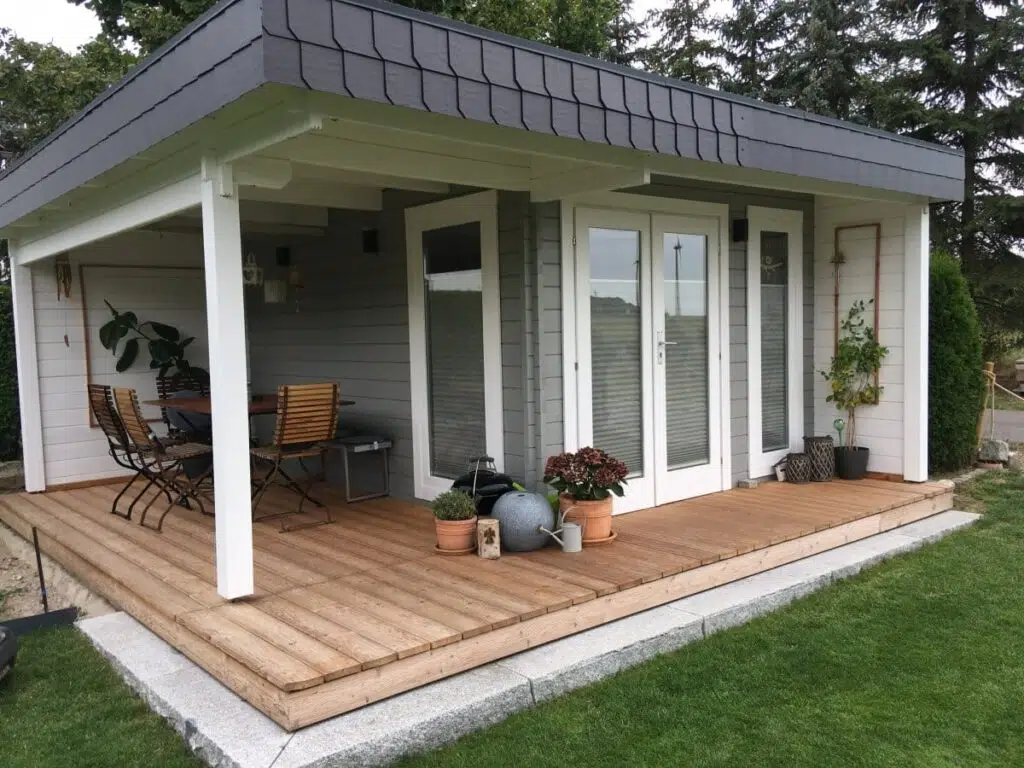
Before we list the main differences between a summer house and a garden shed, it is essential to define each type of structure. Let’s start with the summer house which is an outdoor garden structure that is becoming more and more popular among homeowners in the UK thanks to its many advantages. Summer houses are made of wood or treated timber and their main purpose is to provide extra space for the family. We recommend opting for summer houses that are made from slow-grown Nordic spruce sourced from sustainably managed forests.
Summer houses can have different purposes, nice designs, and premium features such as double-glazed doors and windows, toughened safety glass in doors and windows, and tilt and turn systems, depending on their intended use. A summer house can have a multitude of purposes and, as a result, you will find a varied selection of designs and features in shops. When choosing a product, it is very important to consider your needs, your available space, and your lifestyle.
Outdoor summer houses are designed to be comfortably used throughout every season and they can even become extensions of the main house. If you plan on using your garden building year-round, we recommend adding insulation. To help you decide whether a summer house would be a good option for you and your family, let’s take a look at some of the most common uses for summer houses.
Common Uses for a Summer House
As mentioned above, an outdoor summer house is a versatile structure that can have many different uses including leisure and work activities. Here are a few ideas to help you decide what to do with the unused space in your outdoor area.
Garden Office – Using a summer house as a garden office is a perfect solution for remote workers, freelancers, and modern entrepreneurs. Investing in a garden office pod comes with many benefits such as being able to work in a quiet environment while still being close to home, avoiding traffic and the hustle and bustle of busy city life, saving money in the long term, and having a better work-life balance. If you work from home, you probably notice that focusing can become a bit difficult when you are surrounded by distractions. The good news is that a home office can become a refuge where you can focus on your work without being tempted to watch TV, play with your pets, or do home chores. It will also free your home from all the work equipment.
If you work in an artistic field, you can use such a garden building as an art studio, a writing room, a photo studio, a hobby room, etc. If you opt for an insulated summer house, you will be able to use it comfortably year-round.
Garden Party Room – Summer houses can be a lot of fun, especially when used as party rooms, game rooms, garden bars, man caves, or she sheds. If you enjoy hosting garden parties and like to be surrounded by your family and friends, a summer house bar is a great option for you. It is a great place to set up a large table with chairs and it can protect your garden furniture from rain and snow. Having a designated location for your parties will make your life so much easier as you won’t have to stack the furniture after every party and worry that things might get damaged by the outdoor conditions. Furthermore, your garden will become everyone’s favorite hang-out spot.
Guest House – If your home is not spacious enough to invite your guests to spend the night after a party or to have family over, you can opt for a summer house that can be used as a guest house. Having an extra bedroom in an outdoor summer house comes with a wide range of benefits. You will always be able to help friends and family who need to spend the night, you will have an extra room for relaxation, and you will gain extra space. Similarly, a guest house can also become a granny annexe if an elderly parent requires assistance.
Game Room or Home Cinema – You can use this type of garden building as an entertainment hub for your whole family, whether you are a passionate gamer, cinema lover, or sports enthusiast, you will finally have the extra space needed for these relaxing activities. A game room will also earn you some extra points with your teenage kids and you will surely earn the parent of the year title.
As you can see, a summer house can be used in many ways in terms of functionality; the only limit is your imagination, budget, and available space.
Summerhouse Sizes
When shopping for a garden building, you will notice that most shops offer a great selection of summer house sizes and designs that fit any purpose and space. If you have a small garden, it is best to opt for one of a small summer house. A smaller luxury summer house is an affordable option that provides between 6m² and 14m² of extra space that you can use in many different ways. To make the most out of your small outdoor area, you can also opt for a corner summer house. Smaller summer houses are more affordable and can be great options for garden offices, guest bedrooms, tea rooms, etc.
If you have a more generous budget and more available space, we recommend a large summer house. A large luxury cabin provides between 15m² and 96m² of extra space and they can have multiple purposes.
Does A Summer House Require Planning Permission?
Planning permission for garden buildings is a very important aspect to consider before building any home additions or making any modifications to your outdoor area. As a general rule, in the UK, outdoor summer houses are part of the “permitted development” category of buildings that do not usually require planning permissions, but that might not always be the case. It is best to contact your local authorities before you invest in any type of outbuilding, be it a small one or a large one, just to make sure that you have all the necessary information. You can find more detailed information on the planning regulations guide for the UK.
What Is a Shed?
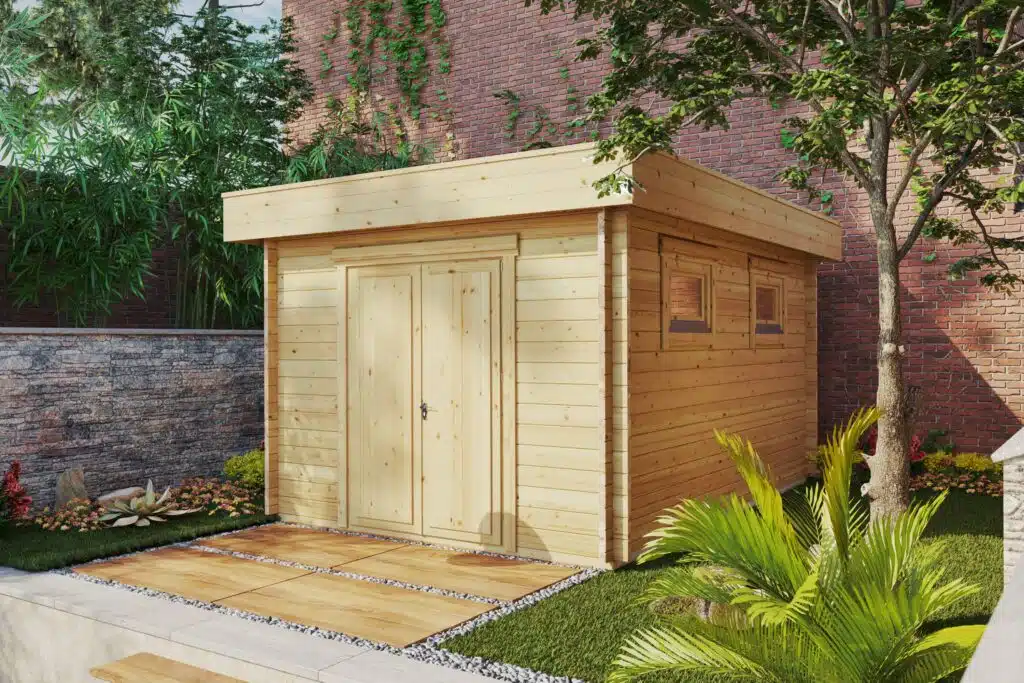
A garden shed is a staple feature in many UK gardens as its main function is storing gardening tools, different types of equipment, machinery, and other similar items that do not usually belong in the house. Most garden sheds are small and can’t accommodate more than one or two people at the same time. Oftentimes, garden sheds will be equipped with many shelves, hooks, and other storage solutions to maximize the usable space.
Usually sheds made from slowly grown and matured wood have a long life span compared to other materials, but can be made of other materials as well. You’ve probably seen that some people opt for metal sheds or plastic sheds. Each type of material comes with advantages and disadvantages, but our experience speaks for wooden sheds due to their viable and eco-friendly nature.
Common Uses for a Garden Shed
As mentioned above, a garden shed is generally used for storage. Some examples of items that can be stored in a garden shed include tools, instruments, machinery, bikes, outdoor equipment, furniture, toys, spare parts for cars, hobby-related items, etc. The possibilities are generally limited when it comes to regular sheds that are small and have no windows. Large wooden sheds on the other hand can have many different uses and they can even used as a summer house.
Can I turn my Shed into a Summer House?
As a general rule, buying a summer house is a better option as this type of building can have multiple functions. If you need both a summer house and a shed, you will find many garden buildings on the market that are equipped with a shed. When it comes to wooden sheds, not all of them can be converted into a summer house. Most sheds are small, made of less sturdy materials, lack insulation, and even windows, which makes turning them into a summer house a difficult task. However, a large shed that is made of high-quality materials can theoretically be converted into a summer house. If you have a basic DIY experience and some free time, transforming your shed into a cozy space can be a fun and rewarding activity. Check out how you can transform your shed into a summer house.
Garden Shed Sizes
When you are shopping for garden sheds, you quickly realize that there are a lot of options available in physical and online stores. Prefabricated sheds can differ in terms of materials, designs, and size. If you are shopping for a regular garden shed that you plan on using solely for storage, we recommend a small garden shed. In general, small sheds can be between 8.5m² and 9m², and, in most cases, you will notice that most sheds can also be used as summer houses. Versatility is a very important benefit that wooden buildings offer.
If your budget and available space allow, you can opt for a large wooden shed. Large ones are usually between 12m² and 37m² and tend to be multifunctional garden buildings. As the name suggests, larger sheds are generally multi-purpose structures that double as garages and extra rooms.
Summer Houses vs. Sheds – What Are the Main Differences?
Now that you know the features and particularities of each of these garden buildings, let’s take a quick look at a few major differences.
Size – A major difference between a storage shed and a summer house is the size. As mentioned throughout the article, summer houses will usually be more spacious than a garden shed and their size will depend on several factors such as the owner’s budget, the intended use, and the available space. A shed is usually smaller and its main function is storage.
Features and Design – A summer house can have more complex features and a nicer design depending on the buyer’s preferences. Wooden garden buildings can be equipped with verandas, large windows, tilt-and-turn systems, toughened glass, insulation, etc. On the other hand, a shed doesn’t necessarily need any windows, especially if its only purpose is storage.
Price – Because summer houses are more spacious and more complex, they will also cost more than a regular wooden shed. It is worth mentioning that a small garden shed and a small summer house can have similar prices. However, a large garden building equipped with insulation and luxury features will cost more.
In Summary
In summary, while both summer houses and sheds can be valuable additions to a garden or backyard, their functions and designs are distinct. A summer house is a leisure space with a focus on comfort and aesthetics, whereas a shed is a practical structure designed for storage and work. The choice between the two depends on the intended use, budget, and available space in your garden.
Before making any purchase, we advise you to thoroughly evaluate your outdoor space and familiarize yourself with the local laws and regulations on garden structures. Whether your choice is a practical garden shed or a luxurious summer house, our diverse range caters to various budgets.
Visit our online store to discover unique products and special offers available for a limited time. Should you have any inquiries about selecting the ideal garden building, feel free to reach out to Summerhouse24 experts today.
Categories:
GuidesWant to discuss over phone. Let us call back to you
If you need any additional info regarding any product, please fill in the below form and we will get back to you, usually the same or next working day.
Have any questions regarding some product?
If you need any additional info regarding any product, please send us your questions.
